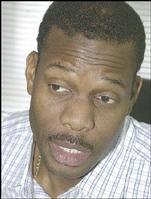Dennise Williams, Staff Reporter
RICARDO MAKYN, Staff Photographer -
Garfield Sinclair
President of DB&G in an interview for the Gleaner Business Magazine at the Head office of DB&G at 7 Holborn Road yesterday.
GARFIELD SINCLAIR, president and chief operating officer (COO) of investment bankers Dehring, Bunting & Golding (DB&G) spoke to The Financial Gleaner about the buoyant prospects for his company.
The investment bankers reported profits after taxes of $460 million for the nine-month period ending December 30, 2004. This represented a 90 per cent increase over the same period in 2003 where profits after taxes was $242 million. Mr. Sinclair happily tells us that this is no accident.
"Well, our excellent 2004 results happened because of a variety of reasons. On our side, we realigned our business model and then we have benefited from the improving economy."
COMPLEMENTARY PRODUCTS
Part of DB&G's business model is to offer complementary products and services. "When interest rates go down, our stock brokerage division does well. When interest rates go up, the foreign exchange market becomes volatile and our cambio does well.
We can also look at bonds because a high interest rate is a buying opportunity. So we are position to take advantage of what happens in the marketplace."
Another change was whom DB&G focused on as their main client base.
Mr. Sinclair explained that the investment house changed focus from fickle institutional investors to the reliable retail market.
"Before our business was 70 per cent institutional and 30 per cent retail. But institutional investors, like pension funds, negotiate harder for interest rates and will switch as rates change. However, retail investors (or individual investors) offer a more stable pool of funds. When interest rates change, individual investors are willing to stick around because they prefer our service. And because of that we can sell more services and products to them."
Hence, the company now has 70 per cent retail and 30 per cent institutional.
Interestingly, the focus on individual investors meant that the company had to spend more money on educating their staff and investors. Unlike institutional investors who have their own investment advisors, individuals tend to rely heavily on their brokers for advice.
Mr. Sinclair tells us, "We have spent a ton of money on our employee training. Better-trained employees give better advice. Customers like that - they can tell if you are unsure about the advice you give. Trust me, when it comes to people's money, it is important that you know what you are saying."
Then the company decided to spend money on educating their existing clients and potential clients.
Although many charge for seminars on investment advise, DB&G believes it is an important component of their business model.
"We travel throughout the island and host financial seminars to inform Jamaicans because we see educated customers as our best friend. Especially in the rural communities, there is a lack of understanding beyond saving your money in the bank. But now, we have sugar farmers who have bought bonds and other sophisticated investment products."
And the performance of the economy has also helped.
"Even the harshest of critics have to say the economy is on the mend. The Jamaican economy has shown maturity evidenced by investor and consumer confidence at an all time high. Our growth prospects are higher than any time in the last ten years."
ALL IS NOT ROSY
Yet, all is not rosy at DB&G. Earlier this month, a former employee, Mark Walters sued the company for $750 million.
Mr. Walters had been employed at DB&G from late 1997 to mid 2004.
He told The Financial Gleaner in a previously published article that he was entitled to such sums as he had met all the performance conditions of his contract.
Mr. Sinclair was staunchly dismissive of the claim.
"The lawsuit is baseless. Every employee at DB&G has a contract that states performance targets. That is not unique to Mark. So why would we go around breaching contracts of employees or anyone we do business with? We value our employees and it has never been our intent to stiff them. How could we survive as a business if we cheated people?"
SIMPLE FACTS
Mr. Sinclair stated the company would be presenting the court the simple facts - that there was indeed a standard contract that all employees get and that DB&G lived up to the conditions of said contract including paying out profit share to all employees entitled to such.
"We will prove that the lawsuit has no basis." But has the lawsuit caused any ill effects for DB&G?
"Absolutely not. Our stock price has not suffered and not one customer has pulled out a red cent. Yes, there have been questions asked; we can't help that. But our customers know that we don't go around cheating our employees. We couldn't stay in business if we did."
Mr. Sinclair also said that employee morale has not suffered because of the lawsuit and in fact, "the treasury unit which Mr. Walters headed, performed better in the last part of 2004 than any other year."













